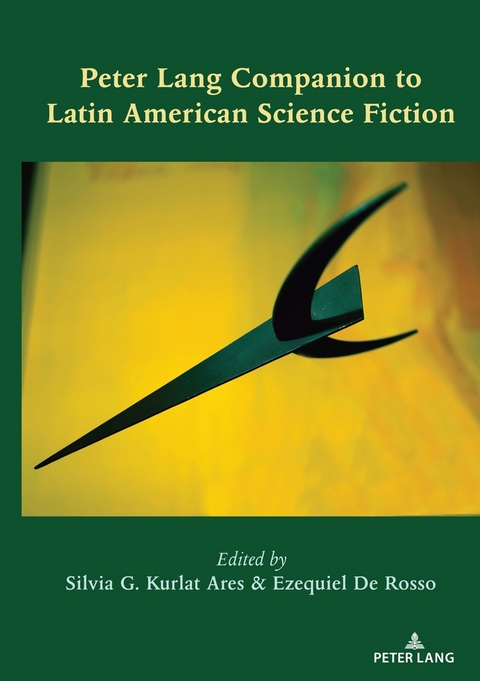
Peter Lang Companion to Latin American Science Fiction
Peter Lang Publishing Inc (Verlag)
978-1-4331-5217-7 (ISBN)
The volume serves the needs of readers interested in science fiction at large, either in its original language or in translation; students trying to understand the genre; and teachers seeking to address the main issues in the development of the genre in the region by including current approaches to the material. The Companion is an indispensable teaching and learning tool, as well as reference book for critics and interested readers.
Silvia G. Kurlat Ares is an independent researcher and holds a Ph.D. from the University of Maryland, College Park and a Postdoc from Johns Hopkins University. She has served as Chair of various LASA Sections and taught at both George Mason University and Johns Hopkins University. Ezequiel De Rosso holds a Ph.D. from the Universidad Nacional de Buenos Aires. A researcher at CONICET, he teaches Latin American literature at the Universidad de las Artes, Universidad Nacional de Buenos Aires, Universidad de Tres de Febrero and Universidad del Cine. His research focuses on different aspects of contemporary Latin American literature, with an interest in the development of genres.
Silvia G. Kurlat Ares/Ezequiel De Rosso: Prologue – Silvia G. Kurlat Ares: Science Fiction in Latin America: Reading a Hidden Landscape – Ezequiel De Rosso: Nervo’s Continuum and the Weariness of Reason: A Hypothesis on the Form of Latin American Science Fiction – Luis C. Cano: Consonance and Subversion: Literary Canon and Popular Narratives – David S. Dalton: Science Fiction vs Magical Realism: Oppositional Aesthetics and Contradictory Discourses in Sergio Arau’s A Day without a Mexican – Juan C. Toledano Redondo: The Hispanic Caribbean as a Three-Winged Bird: Science Fiction Production as Transculturation – Rodrigo Bastidas Pérez: Science Fiction Magazines in Latin America: The Tension between Readability and Innovation – Carlos Abraham: An Overview of the Latin American Science Fiction Market – Pablo Brescia: Great Expectations? Latin American Science Fiction and Canon (Con)figurations – Ramiro Sanchiz: That’s the Attitude: Magazines, Communities and Counterculture in Uruguay and Latin America (1989–2013) – Ariela Schnirmajer: Uses of Utopia in the Disputes of the Lettered City (1770–1850) – Juan Pisano: An Unnatural Selection: Science, Progress and Fiction (1850–1930) – Miguel Ángel Fernández Delgado: The Dissemination of a Literary Genre (1940–1959) – Maielis González Fernández: Made at Home: On Some of the Forms and Uses of the Science Fiction Genre (1960–1990) – Emily A. Maguire: From Technological Realism to the Science-Fictional Turn in Latin American Literature (1985–2017) – Iván Rodrigo Mendizábal: The Political Dimension of Latin American Science Fiction – Sandra Gasparini: Political Corpses: Zombies in Recent Argentine Narrative – Alejo Steimberg: Fictional Universes in Science Fiction: The Latin American Case – Macarena Cortés: Agency and Opening of Female Bodies in the First Stories of Aldunate, Gorodischer and Chaviano – Teresa López-Pellisa: Women Science Fiction Writers in Latin America: Bioethics and Biopolitics in Laura Ponce and Alicia Fenieux – Antonio Córdoba: Aliens, Mutants, Cyborgs, Digital Selves: Avatars of the Posthuman in Latin American Science Fiction – Éverly Pegoraro: Steampunk Science Fiction: Brazilian Appropriations – Giovanna Rivero: An Ecology of the Death of the Species: The Mourning Play as a Narrative Form Joanna Page: Technology in Latin American Science Fiction: Allegories of Consumption and Conspiracy – Marcos Adrián Pérez Llahí/Silvia Angiola: The Eternal Dream of a Minor Cinema: Latin American Dalliances with Science Fiction – Raúl Aguiar: Experimentation, Utopia and Dystopia in Cinema (1969–1999) – Elton Honores: Invasions, Adventures and Space Travel in the Visual Language of Comics – Héctor Fernández L’Hoeste: On the Trail of the Murderous State: On Latin American Alternate History – Lyz Reblin-Renshaw: Looking Forward to Our Past: A Retrospective on Science Fiction Video Games – Notes on Contributors – Index.
“This all started about sixty years ago. In Argentina, there were very few science fiction readers: people like Patricio Esteve, Angélica Gorodischer, Héctor R. Pessina, some Latin teachers and me. However, Paco Porrúa was editing the best of the genre, Borges appreciated it, and Bioy Casares practiced it. The academic world, with the notable exception of Raúl H. Castagnino, preferred to ignore it. As a student, I remember being reprimanded for writing about Lovecraft without waiting for the approval of French criticism.
A couple of generations later, I found myself participating in international conferences on science fiction, which the university itself now convened. What was once the subject of sarcasm had become a respectable subject.
What had happened? Well, the readers, ignoring academic admonitions, had multiplied. The genre tempted writers and mobilized researchers. If there were so many explorers and cartographers, it was because the forest had grown beyond expectations. Perhaps much of what was being written was not liked by veterans like me, but we had always promoted variety.
Age can drive us to skepticism or resentment, but it can also give us the pleasure of tasting the fruits of what we once sowed. A book like this one, which explores the rich and multifaceted landscape of Latin American science fiction, is the best proof.”
—Pablo Capanna, Philosophy Professor, sf specialist, columnist for the Minotauro and El péndulo magazines
| Erscheinungsdatum | 10.10.2019 |
|---|---|
| Verlagsort | New York |
| Sprache | englisch |
| Maße | 178 x 254 mm |
| Gewicht | 833 g |
| Themenwelt | Literatur ► Fantasy / Science Fiction ► Science Fiction |
| Literatur ► Krimi / Thriller / Horror ► Horror | |
| Geisteswissenschaften ► Sprach- / Literaturwissenschaft ► Anglistik / Amerikanistik | |
| Geisteswissenschaften ► Sprach- / Literaturwissenschaft ► Literaturwissenschaft | |
| Geisteswissenschaften ► Sprach- / Literaturwissenschaft ► Romanistik | |
| ISBN-10 | 1-4331-5217-7 / 1433152177 |
| ISBN-13 | 978-1-4331-5217-7 / 9781433152177 |
| Zustand | Neuware |
| Informationen gemäß Produktsicherheitsverordnung (GPSR) | |
| Haben Sie eine Frage zum Produkt? |
aus dem Bereich


